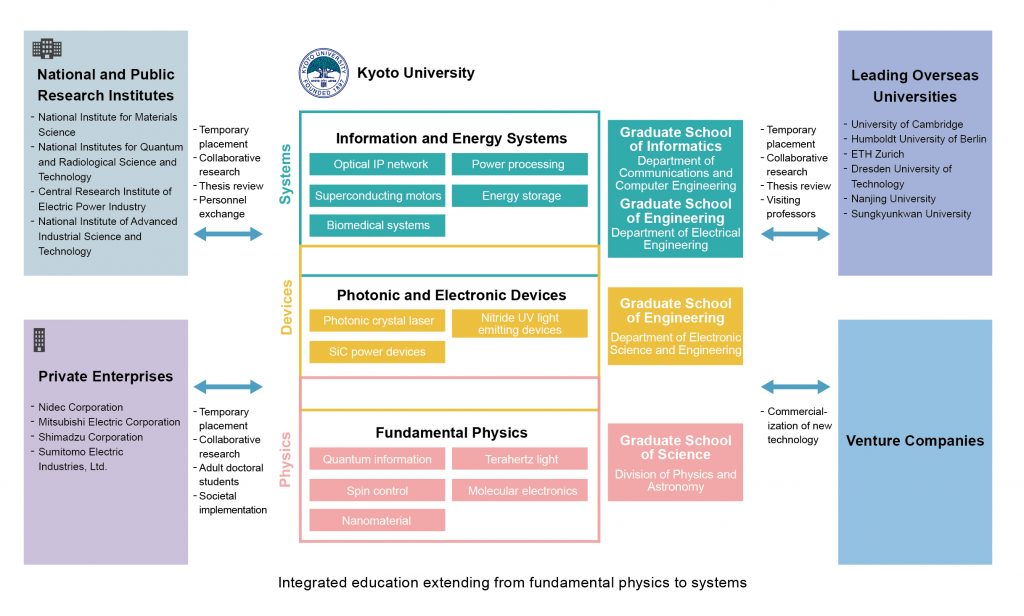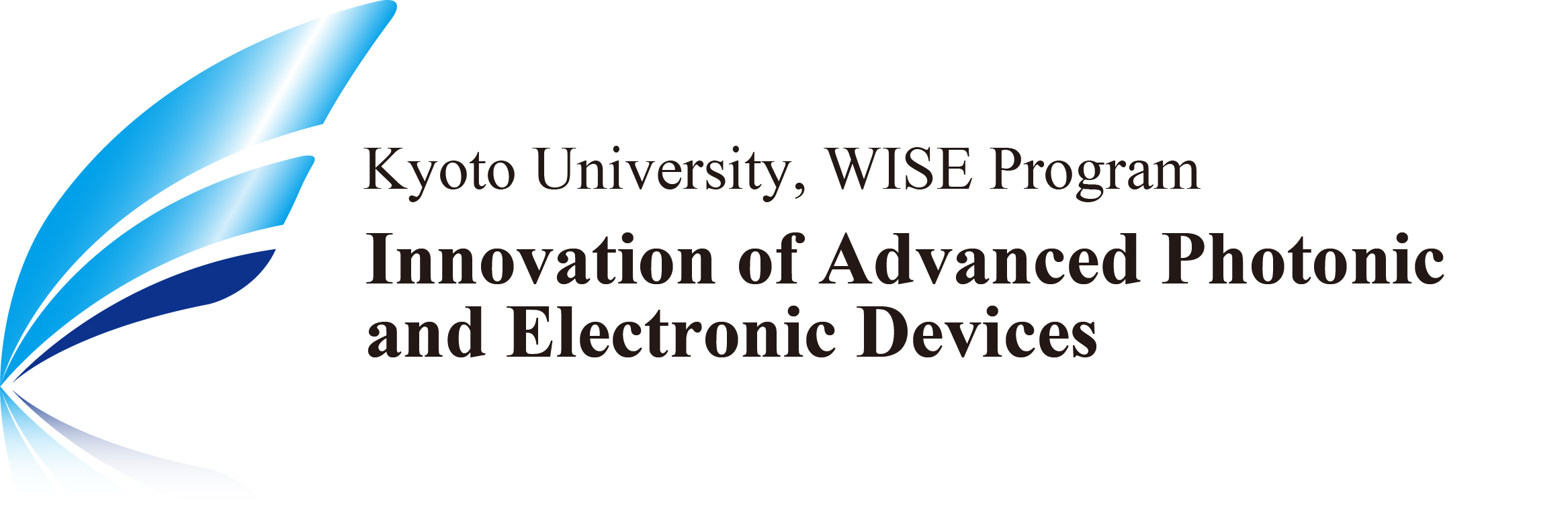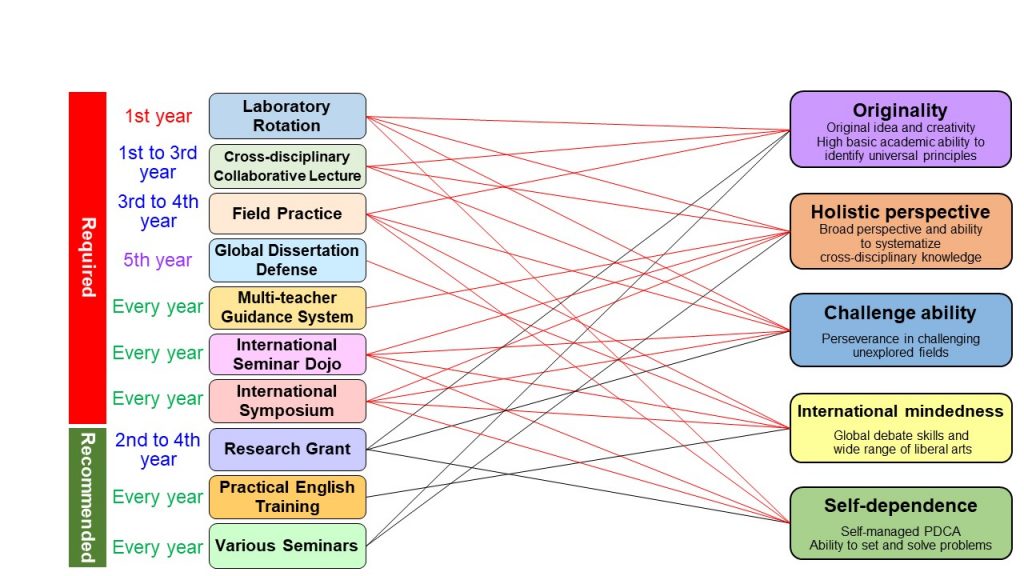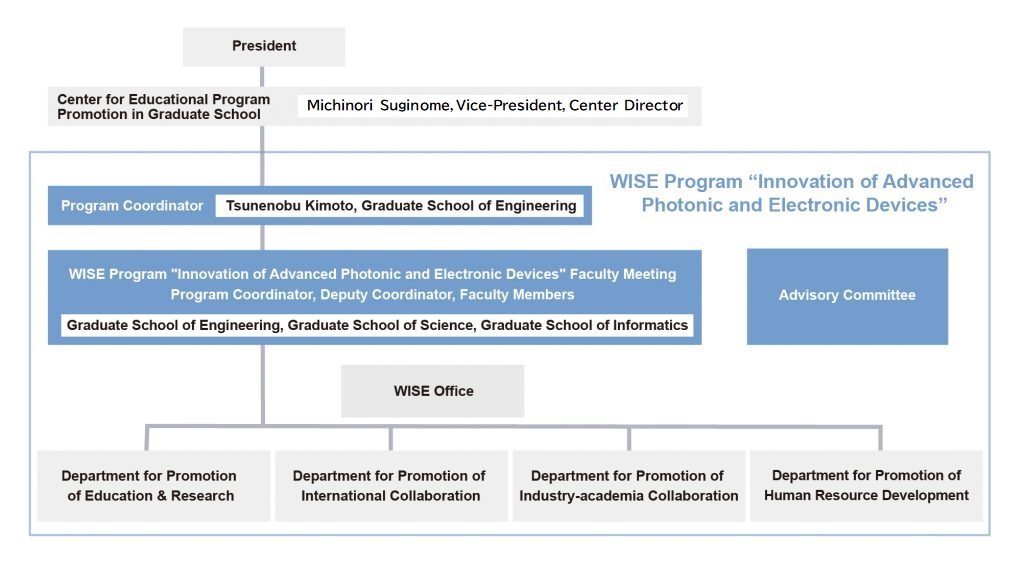Features
Features
Human society is currently entering a period of significant transformations focused on electronics such as the IoT (Internet of Things) revolution, wearable information devices, self-driving and electric cars, and smart grid. In such a society, many high-performance photonic and electronic devices function as the core of the hardware while being organically integrated, and require further performance enhancement and creation of new functions in the future. On the other hand, the explosive expansion of knowledge, due to advances in science and technology in recent years, has given rise to the problem of a lack of comprehensive outlook as a significant subdivision of specialized fields was developed. In particular, it is considered that specialized education in a specific discipline is not enough to solve issues of a wide range of fields of human society such as advanced information-oriented society, environment, energy, and artificial intelligence. It is essential to nurture talents who can make correct decisions while looking at everything, from fundamental theories to system application, with a holistic perspective, resolve challenging issues, and lead the critical fields in the future.
At Kyoto University, we have our original scientific concepts and key technologies that should be called “Originated in Our University”. This WISE program (Doctoral Program for World-leading Innovative & Smart Education) promotes combined and vertically integrated education focused on the field of photonic and electronic devices, extending from deepening the understanding of fundamental physics and theory to the management and application of systems and information. Also, we collaborate with private enterprises representing Japan around the world, national and public research institutes with the highest level of research capabilities, and top-class and leading overseas universities. Moreover we systematically implement education and quality assurance of a global standard and raise world-class professionals of knowledge who create “Advanced Photonic and Electronic Devices” through an integrated 5-year doctoral degree program.
Policy
1 ⃣ Diploma policy
Human society is currently undergoing a major transformation centered on electronics, including the IoT (Internet of Things) revolution, wearable information devices, automated driving and electrification of cars, and smart grids. In such a society, a myriad of high-performance optical and electronic devices are functioning as the core of hardware, organically integrated, and will require even higher performance and the creation of new functions in the future. On the other hand, the explosive expansion of knowledge resulting from recent advances in science and technology has led to a remarkable fragmentation of specialized fields, which in turn has created the problem of a lack of comprehensive vision. In order to solve problems in a wide range of fields in human society, it is important to develop human resources who can make correct judgments, tackle challenging problems, and lead the field in the future, while keeping an overview of everything from basic science to system applications.
In this program, we aim to foster international leaders who can lead advanced optical and electronic devices and related academic fields with a strong sense of responsibility and high ethical standards, based on the common philosophy of “challenging the limits of physics and developing an information and energy-saving society.
Based on the above human resource development goals, students who meet the following conditions will be recognized as graduates of this program, and their completion of this program will be written on the degree certificate awarded by each graduate school.
(1) Enroll in the participating graduate school or department for at least five years (three years for third-year transfer students), receive research guidance, meet the requirements for completion of their department, and submit a doctoral dissertation within the prescribed period. D. thesis submitted within the prescribed period and pass the examination.
(2) It must be confirmed by the Degree Examination Committee that the student has completed or attained all of the following during his/her enrollment in this program, and the student must pass the final examination by the Degree Examination Committee. In addition, students must have acquired originality, a bird’s-eye view, the ability to take on challenges, international ability, independence, a strong sense of responsibility, and high ethical standards.
(a) Laboratory rotation
(b) Industry-government-academia collaboration lectures
(c) Field practice
(d) The research for the dissertation must be conducted under the guidance of multiple faculty members from different fields in accordance with the philosophy of this Graduate School of Excellence.
(d) Thesis research must be conducted under the guidance of multiple faculty members from different fields based on the philosophy of this Graduate School of Excellence.
(e) Thesis research must be reviewed by leading overseas researchers in the relevant field.
2 ⃣ Curriculum policy
Kyoto University’s Graduate School of Excellence in Advanced Photonics and Electronic Device Science offers a five-year doctoral degree program to develop the human resources described in the degree conferment policy, focusing on the fields of photonics and electronic devices. In addition, we will promote a vertically-integrated education that spans from basic physics and theory to systems and information control and applications. In addition, we will systematically implement education and quality assurance based on global standards in cooperation with Japan’s leading private companies, national and public research institutes with the highest level of research capabilities, and leading overseas universities.
The Graduate School of Engineering, Science, and Informatics, while respecting the curricula of the Graduate School of Engineering, Science, and Informatics, will be the focus of this program in order to develop human resources with the five abilities of originality, bird’s eye view, challenge, internationalization, and independence, as well as highly specialized knowledge and skills, and a strong sense of responsibility and ethics. In order to develop human resources with highly specialized knowledge and skills, and a strong sense of responsibility and ethics, we respect the curricula of the Graduate School of Engineering, the Graduate School of Science, and the Graduate School of Informatics, while promoting fusion education that breaks down the barriers between the graduate schools, which is one of the special features of this program.
In concrete terms, the program is as follows
In order to acquire the ability to be original and to see things from a bird’s-eye view, students will be guided by multiple supervisors from the time they enter the program (from the first year of the master’s course to the third year of the doctoral course).
In the first year of the master’s course, students are given omnibus lectures in collaboration with industry, government, and academia to learn about cutting-edge research and the current state of social implementation in order to acquire the ability to be creative, to see things from a bird’s-eye view, and to take on challenges. In the first year of the master’s course, students transferring to the doctoral course will be in the first year of the doctoral course.)
In the first year of the master’s course, students rotate to other laboratories to engage in research other than their own in order to acquire the ability to be original and independent.
In the first year of the master’s course, students are assigned to a laboratory other than the one to which they belong in order to develop their originality and self-reliance.
In order to acquire international and independent skills, we conduct “Field Practice” in which students stay for a short period of time at domestic partner institutions (national and public research institutes and companies) and overseas partner universities to conduct research (1st and 2nd year of doctoral course).
In the second year of the master’s course, students are encouraged to apply for the “Research Grant for the Creation of Optoelectronic Devices,” which provides research grants after reviewing research proposals based on students’ free ideas, in order to acquire the ability to be original, challenging, and independent.
In order to acquire a high level of ethics, students are strongly encouraged to take courses related to research ethics and research fairness (1st year of Master’s course to 3rd year of Doctoral course).
Under the various educational programs described above, students are evaluated based on their research progress reports and credit acquisition status in each year from the first year of the master’s course to the first year of the doctoral course. In the research progress report, students give a presentation on their research, and are evaluated on whether the content of the presentation and the questions and answers are of a sufficient standard. The results of lecture courses are evaluated based on reports, presentations in class, and other normal points, while the results of exercises and practical training courses are evaluated based on the overall level of proficiency, understanding, and achievement of goals. In the final year of the program, in accordance with the policy for awarding degrees, the final decision on completion of the program is made based on the evaluation of the doctoral dissertation by leading overseas researchers in the relevant field, as well as the participation and achievement status in each program. In order to complete the program, students must pass the doctoral dissertation review and examination at their respective graduate school.
The curriculum map shows the positioning of the various educational programs in each academic year and the relationship between these programs and the five skills to be developed.
3 ⃣ Admission policy
The IoT (Internet of Things) revolution, wearable information devices, autonomous driving and electrification of cars, smart grids, etc., human society is currently undergoing a major transformation centered on electronics. In this period of great change, in order to solve problems in a wide range of fields of human society, it is necessary to make correct decisions and tackle challenging problems from a bird’s-eye view of basic science and system application.
At Kyoto University’s Graduate School of Excellence, “Advanced Optical and Electronic Device Creation Studies,” we will develop “creativity” that creates unique ideas about science and technology, “overhead power” that allows us to see from basic science to application across fields, and unexplored fields. Fostering human resources who have “challenge power”, “international power” to play an active role at the world level, and “independence power” to manage and improve research activities by themselves, and a strong sense of responsibility for advanced optical / electronic devices and related academic / research fields. We aim to develop international leaders who can lead with high ethics. The image of students desired at this outstanding graduate school is as follows.
・ Those who sympathize with the purpose of the above program and aim to be active internationally in companies, research institutes, and educational institutions in the fields of advanced optical and electronic devices and related academic and R & D fields.
・ Persons who have the basic academic ability and intellectual curiosity necessary to search for the truth in their specialized fields and related academic fields, and who can persistently try to solve problems.
・ A person who has excellent logical thinking ability and can make decisions that are not bound by preconceived ideas.
In the selection of program students, we will focus on the basic academic ability of the specialized field in which you wish to study, and also evaluate the basic ability to promote and develop advanced research. For selection, in addition to document screening based on applications, aspirations, academic transcripts of the university (graduate school) of origin, etc., interview screening will be conducted as necessary. This program includes either the Master’s program or the Master’s program of the Graduate School of Engineering, Department of Electrical Engineering, Department of Electronic Engineering, Graduate School of Science, Department of Physics / Space Physics, Graduate School of Informatics, Department of Communication Information Systems.
・ Applicants or applicants who are admitted to the doctoral program in the second semester (cooperation) can apply. However, applicants must be admitted. It is also possible for those who are admitted to the doctoral program to apply for transfer to the third year of the program.


